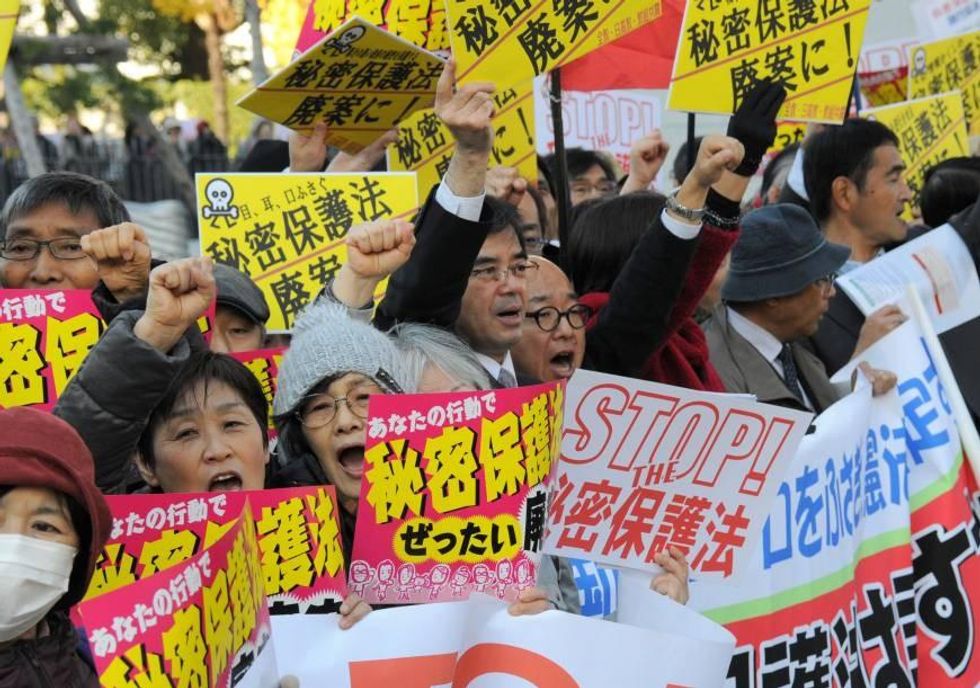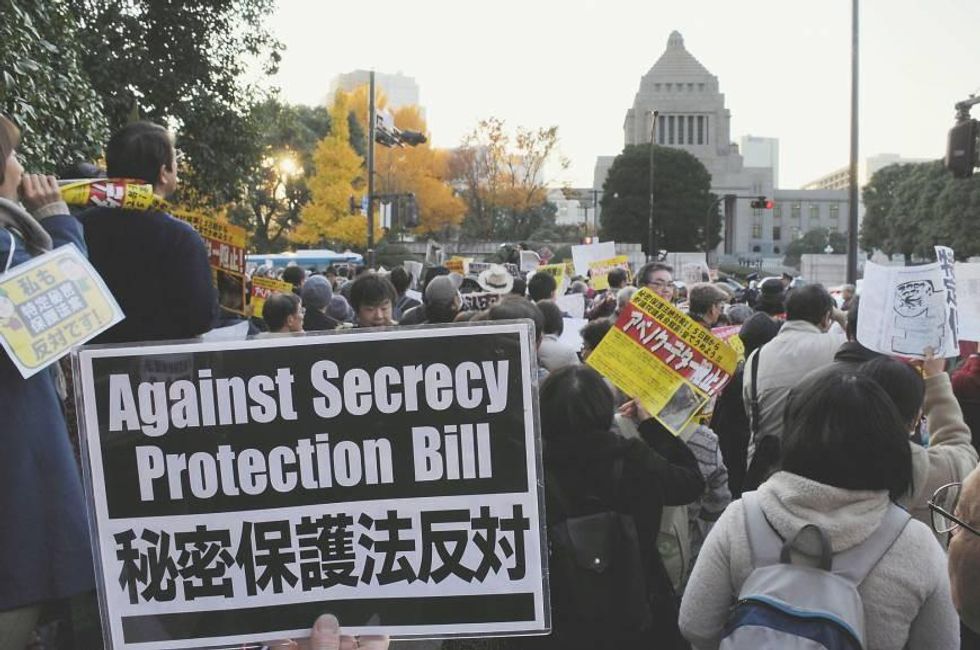

SUBSCRIBE TO OUR FREE NEWSLETTER
Daily news & progressive opinion—funded by the people, not the corporations—delivered straight to your inbox.
5
#000000
#FFFFFF
To donate by check, phone, or other method, see our More Ways to Give page.


Daily news & progressive opinion—funded by the people, not the corporations—delivered straight to your inbox.

Under the new law, which was pushed by Japan's Prime Minister Shinzo Abe, public officials could face up to 10 years in prison for exposing "state secrets," which could include "sensitive information about the Fukushima nuclear disaster and the country's souring relations with China," as The Guardian reports. Journalists who seek out classified information could face up to five years.
"The chief criticism of the bill is its vague definition of what constitutes a state secret, potentially giving officials carte blanche to block the release of information on a vast range of subjects," The Guardian adds.
As Reuters notes, "The passing of the law coincides with a worldwide debate on secrecy after former U.S. National Security Agency contractor Edward Snowden leaked documents and a U.S. Army private leaked information to anti-secrecy group Wikileaks."
Critics say the bill will strangle media freedoms and help cover up wrongdoings inside of the government.
The bill's journey through Japan's parliament, the Diet, has been marked with public uproar and protest.
Over 30,000 protesters had gathered Thursday night as lawmakers "rammed legislation through the Upper House Special Committee on National Security," The Japan Times reports.
Following the bill's passage, a crowd formed throughout the day Friday and is expected to surpass Thursday's numbers.
"It is a threat to democracy," said Keiichi Kiriyama a journalist at the newspaper Tokyo Shimbun. The legislation will "have a chilling effect on public servants, who could become wary about giving the information," said Kiriyama.
"There is a demand by the established political forces for greater control over the people," said Lawrence Repeta, a law professor at Meiji University. "This fits with the notion that the state should have broad authority to act in secret. It seems very clear that the law would have a chilling effect on journalism in Japan."

_______________________
Dear Common Dreams reader, The U.S. is on a fast track to authoritarianism like nothing I've ever seen. Meanwhile, corporate news outlets are utterly capitulating to Trump, twisting their coverage to avoid drawing his ire while lining up to stuff cash in his pockets. That's why I believe that Common Dreams is doing the best and most consequential reporting that we've ever done. Our small but mighty team is a progressive reporting powerhouse, covering the news every day that the corporate media never will. Our mission has always been simple: To inform. To inspire. And to ignite change for the common good. Now here's the key piece that I want all our readers to understand: None of this would be possible without your financial support. That's not just some fundraising cliche. It's the absolute and literal truth. We don't accept corporate advertising and never will. We don't have a paywall because we don't think people should be blocked from critical news based on their ability to pay. Everything we do is funded by the donations of readers like you. Will you donate now to help power the nonprofit, independent reporting of Common Dreams? Thank you for being a vital member of our community. Together, we can keep independent journalism alive when it’s needed most. - Craig Brown, Co-founder |

Under the new law, which was pushed by Japan's Prime Minister Shinzo Abe, public officials could face up to 10 years in prison for exposing "state secrets," which could include "sensitive information about the Fukushima nuclear disaster and the country's souring relations with China," as The Guardian reports. Journalists who seek out classified information could face up to five years.
"The chief criticism of the bill is its vague definition of what constitutes a state secret, potentially giving officials carte blanche to block the release of information on a vast range of subjects," The Guardian adds.
As Reuters notes, "The passing of the law coincides with a worldwide debate on secrecy after former U.S. National Security Agency contractor Edward Snowden leaked documents and a U.S. Army private leaked information to anti-secrecy group Wikileaks."
Critics say the bill will strangle media freedoms and help cover up wrongdoings inside of the government.
The bill's journey through Japan's parliament, the Diet, has been marked with public uproar and protest.
Over 30,000 protesters had gathered Thursday night as lawmakers "rammed legislation through the Upper House Special Committee on National Security," The Japan Times reports.
Following the bill's passage, a crowd formed throughout the day Friday and is expected to surpass Thursday's numbers.
"It is a threat to democracy," said Keiichi Kiriyama a journalist at the newspaper Tokyo Shimbun. The legislation will "have a chilling effect on public servants, who could become wary about giving the information," said Kiriyama.
"There is a demand by the established political forces for greater control over the people," said Lawrence Repeta, a law professor at Meiji University. "This fits with the notion that the state should have broad authority to act in secret. It seems very clear that the law would have a chilling effect on journalism in Japan."

_______________________

Under the new law, which was pushed by Japan's Prime Minister Shinzo Abe, public officials could face up to 10 years in prison for exposing "state secrets," which could include "sensitive information about the Fukushima nuclear disaster and the country's souring relations with China," as The Guardian reports. Journalists who seek out classified information could face up to five years.
"The chief criticism of the bill is its vague definition of what constitutes a state secret, potentially giving officials carte blanche to block the release of information on a vast range of subjects," The Guardian adds.
As Reuters notes, "The passing of the law coincides with a worldwide debate on secrecy after former U.S. National Security Agency contractor Edward Snowden leaked documents and a U.S. Army private leaked information to anti-secrecy group Wikileaks."
Critics say the bill will strangle media freedoms and help cover up wrongdoings inside of the government.
The bill's journey through Japan's parliament, the Diet, has been marked with public uproar and protest.
Over 30,000 protesters had gathered Thursday night as lawmakers "rammed legislation through the Upper House Special Committee on National Security," The Japan Times reports.
Following the bill's passage, a crowd formed throughout the day Friday and is expected to surpass Thursday's numbers.
"It is a threat to democracy," said Keiichi Kiriyama a journalist at the newspaper Tokyo Shimbun. The legislation will "have a chilling effect on public servants, who could become wary about giving the information," said Kiriyama.
"There is a demand by the established political forces for greater control over the people," said Lawrence Repeta, a law professor at Meiji University. "This fits with the notion that the state should have broad authority to act in secret. It seems very clear that the law would have a chilling effect on journalism in Japan."

_______________________